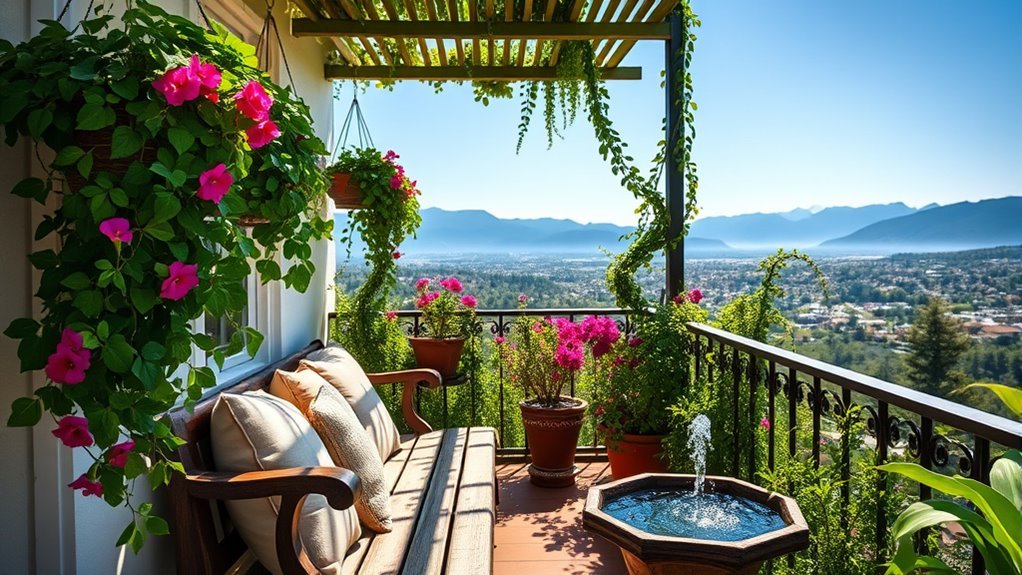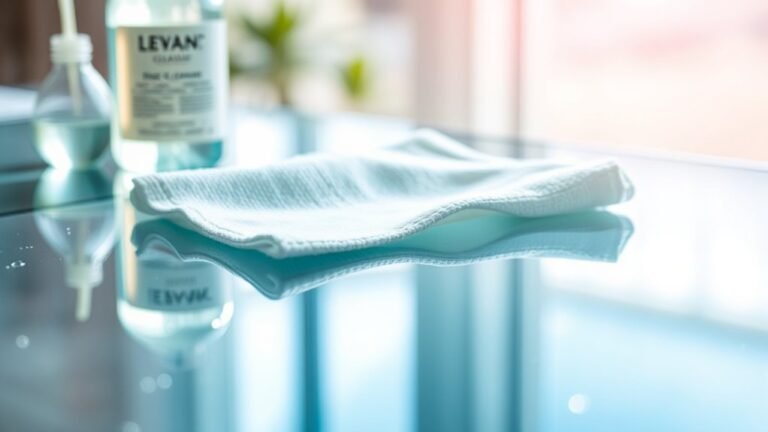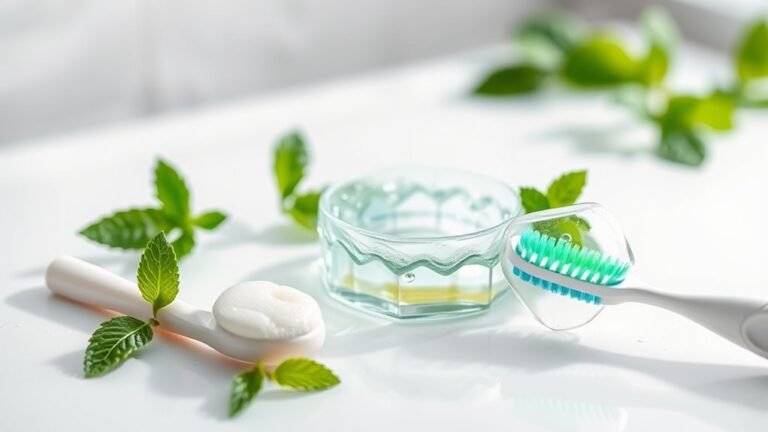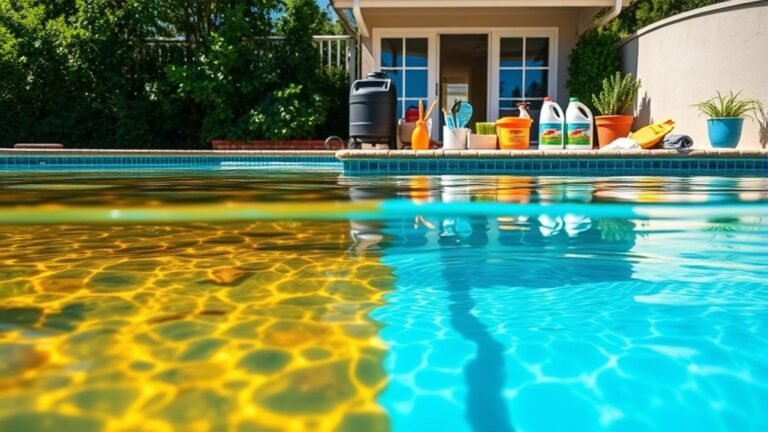Natural Alternatives to Balcony
You can create a natural balcony retreat by choosing sustainable options like reclaimed wood decking and bamboo railings, both durable and eco-friendly. Incorporate living green walls for privacy while improving air quality. Flooring alternatives like porcelain tiles or recycled composite materials balance style and toughness. Add native plants and herbs to support local ecosystems, and use solar-powered lighting for energy efficiency. If you explore further, you’ll find more ways to enhance your outdoor space sustainably and stylishly.
Sustainable Wooden Decking Options
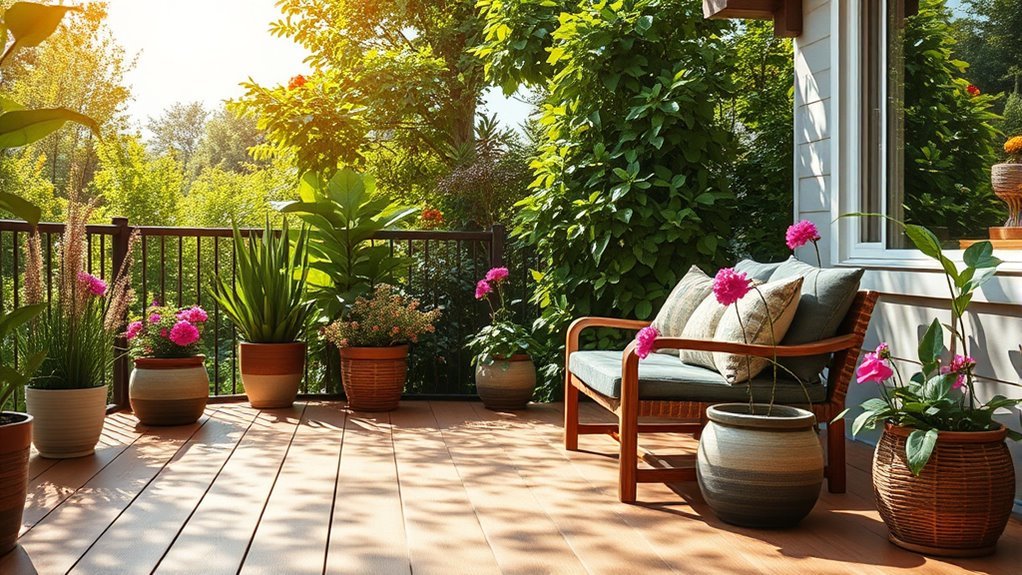
While choosing decking materials, you’ll want to contemplate sustainable wooden options that minimize environmental impact without sacrificing durability. Reclaimed wood is an excellent choice; it repurposes existing materials, reducing the need for new timber harvesting and limiting deforestation. This option also offers unique character and strength, giving your balcony a natural, timeless look. Alternatively, composite materials blend wood fibers with recycled plastics, creating a low-maintenance, long-lasting surface that resists rot and insects. Composites require less upkeep, allowing you more freedom to enjoy your space without constant repairs. Both options support sustainability and longevity, so you can balance ecological responsibility with the freedom to relax on a durable, appealing balcony. Choosing reclaimed wood or composite decking helps you create an environmentally mindful outdoor space without compromising on performance. Additionally, supporting local artisans who provide these materials can further reduce your carbon footprint and promote community sustainability.
Bamboo Railings and Furniture
You’ll find bamboo railings and furniture offer sustainable benefits due to their rapid growth and renewability. They also provide versatile design options, fitting both modern and traditional aesthetics. Plus, with proper treatment, bamboo products can be durable and require minimal maintenance.
Sustainable Material Benefits
Because bamboo grows rapidly and requires minimal resources, it stands out as an eco-friendly choice for balcony railings and furniture. When you opt for bamboo combined with recycled plastic components and organic finishes, you reduce environmental impact while ensuring durability. This sustainable material offers practical benefits that align with your desire for freedom from wasteful consumption.
- Bamboo’s fast growth means less deforestation and quicker replenishment.
- Its strength rivals traditional hardwoods, providing long-lasting support.
- Organic finishes avoid harmful chemicals, keeping your balcony healthy.
- Pairing bamboo with recycled plastic elevates resistance to weather damage.
Design Versatility Options
When choosing bamboo for your balcony, consider its exceptional design versatility that adapts to various styles and functions. Bamboo railings can be customized with different finishes to complement your preferred balcony color schemes, whether you want a natural look or a modern contrast. This flexibility allows you to create a coherent aesthetic that reflects your personal freedom in design choices. Additionally, bamboo versatile furniture offers lightweight, durable options that can be easily rearranged or repurposed, enhancing your outdoor space’s functionality. Its natural textures blend well with various color palettes, supporting both minimalist and vibrant settings. By selecting bamboo, you gain a material that supports seamless integration of style and practicality, empowering you to tailor your balcony environment precisely to your lifestyle and design aspirations.
Maintenance and Durability
Beyond its adaptable design, bamboo requires specific care to maintain both its appearance and structural integrity over time. When considering bamboo railings and furniture for your balcony, focusing on balcony upkeep is vital to guarantee material longevity. Bamboo’s natural fibers can degrade if exposed to moisture and UV rays without protection. You’ll need to implement routine maintenance to keep your bamboo elements durable and visually appealing.
Here are key tips for effective bamboo maintenance:
- Regularly clean with a mild soap solution to remove dirt and prevent mold.
- Apply a UV-resistant sealant annually to protect against sun damage.
- Inspect for cracks or splinters and sand them down promptly.
- Store or cover furniture during harsh weather to reduce wear.
Living Green Walls for Privacy
Although space on balconies is often limited, living green walls offer an efficient solution for enhancing privacy without sacrificing aesthetics. By installing vertical gardens, you can create a lush, natural barrier that maximizes your outdoor area while providing green privacy from neighbors. These vertical setups utilize minimal floor space and can be customized with various plant species to suit your climate and light conditions. Besides blocking views, green walls improve air quality and reduce noise, promoting a freer, more serene environment. To maintain their effectiveness, choose hardy plants and guarantee proper irrigation systems are in place. Living green walls not only protect your privacy but also integrate nature into your living space, making your balcony feel more open and connected to the outdoors.
Natural Stone Flooring Alternatives
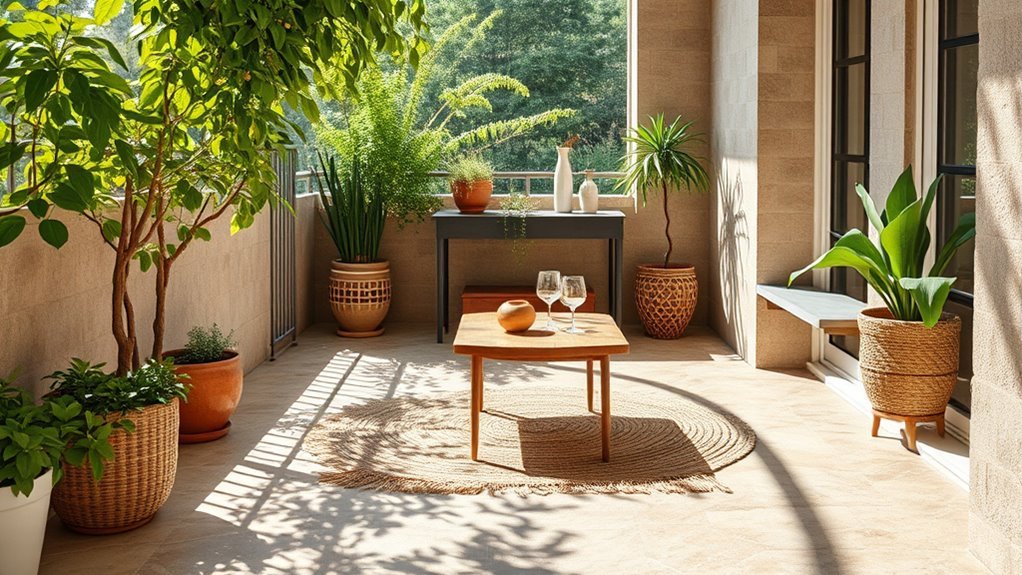
If you’re looking to replicate the elegance of natural stone flooring without the high cost or maintenance, several alternatives can deliver similar durability and aesthetic appeal. Opting for materials that mimic granite tile or slate pavers offers you freedom from frequent upkeep while maintaining a refined look. Consider these natural stone flooring alternatives for your balcony:
- Porcelain tiles: Resemble granite tile but resist stains and scratches better.
- Concrete pavers: Can be stamped or colored to imitate slate pavers affordably.
- Engineered stone tiles: Combine crushed natural stone with resin for durability.
- Composite decking: Made from recycled materials, offering slip resistance and longevity.
Each option balances toughness and style, letting you enjoy your outdoor space without compromise. Additionally, choosing materials made from recycled materials supports sustainability by reducing plastic waste and environmental impact.
Planters Made From Recycled Materials
You can choose from various eco-friendly container options made from recycled materials to reduce waste and support sustainability. Creating DIY recycled planters using items like old pallets, tin cans, or plastic bottles not only saves money but also adds a unique touch to your balcony garden. These solutions effectively combine functionality with environmental responsibility.
Eco-Friendly Container Options
Since traditional planters often contribute to plastic waste, choosing containers made from recycled materials offers a sustainable alternative that reduces environmental impact. You can select eco-friendly ceramics that combine durability with environmental responsibility, or biodegradable pots that naturally break down, minimizing landfill contribution. These options let you cultivate your balcony garden while staying true to eco-conscious values. Consider these container choices for a greener approach:
- Planters crafted from recycled glass, offering unique aesthetics and reusability
- Biodegradable pots made of coconut coir or rice husks, which decompose safely
- Eco friendly ceramics produced using sustainable clay and low-energy firing methods
- Containers fabricated from repurposed wood, avoiding harmful chemicals and plastic
DIY Recycled Planter Ideas
While exploring sustainable gardening, turning everyday waste into planters can be a practical and eco-friendly solution. You can create upcycled tire planters by cleaning old tires, painting them with non-toxic paint, and filling them with soil to cultivate various plants. This method reduces landfill waste and provides durable, weather-resistant containers. Alternatively, wooden crate gardens offer a versatile option; repurposed wooden crates can be lined with landscape fabric, filled with soil, and arranged to maximize space. Both approaches allow you to customize sizes and shapes, promoting freedom in design while minimizing environmental impact. By opting for these recycled materials, you not only save resources but also foster a sustainable gardening practice that aligns with eco-conscious living—empowering you to transform discarded items into thriving green spaces.
Eco-Friendly Outdoor Fabrics
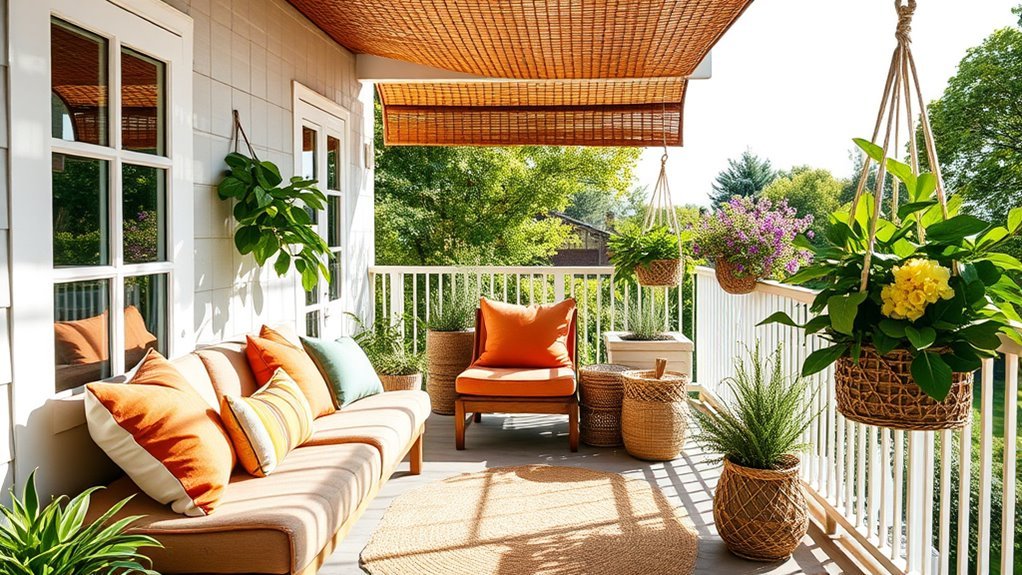
Although choosing the right outdoor fabric might seem straightforward, opting for eco-friendly materials can markedly reduce your balcony’s environmental impact. You can enjoy durable, stylish fabrics without compromising sustainability by selecting options like organic cotton or recycled polyester. These materials minimize chemical use and reduce waste, aligning with eco-conscious living. When picking fabrics, consider:
- Breathability and UV resistance to enhance longevity
- Water repellency without harmful coatings
- Certifications like GOTS for organic cotton authenticity
- The recycled content percentage in polyester blends
Incorporating Native Plants and Herbs
When you incorporate native plants and herbs into your balcony garden, you’re tapping into a sustainable strategy that supports local ecosystems and reduces maintenance needs. Native herb gardens thrive with minimal watering and fertilizer since these plants are adapted to your region’s climate and soil. Choosing pollinator friendly plants like native lavender or coneflowers encourages bees and butterflies, enhancing biodiversity right on your balcony. This natural approach not only saves resources but also fosters a self-sustaining environment. You gain freedom from constant upkeep and chemical inputs, allowing your space to flourish effortlessly. By prioritizing native species, you create a resilient, eco-conscious retreat that aligns with nature’s rhythms while inviting beneficial insects that contribute to your garden’s health and productivity. Additionally, using biodegradable materials in your gardening practices helps prevent pollution and protect ecosystems while supporting sustainability.
Solar-Powered Natural Lighting
Because balconies often lack sufficient natural light, integrating solar-powered lighting offers an efficient way to brighten your space without increasing energy costs. Solar energy efficiency has improved considerably, making eco friendly lighting accessible and practical for outdoor areas. By harnessing sunlight during the day, these systems power lights at night without relying on electricity, promoting sustainability while enhancing your balcony’s ambiance. You gain freedom from wiring constraints and utility bills, creating a self-sufficient lighting solution.
Solar-powered lighting brightens balconies sustainably, eliminating wiring and energy costs while enhancing ambiance effortlessly.
Consider these advantages:
- Simple installation with no electrical hookups needed
- Automatic charging and lighting cycles
- Minimal maintenance and long lifespan
- Variety of designs to match natural aesthetics
Embracing solar-powered natural lighting lets you optimize your balcony environment responsibly and independently. Solar panels convert sunlight into electrical energy, enabling these lighting systems to operate efficiently without traditional power sources.
Handmade Natural Fiber Decorations
Three key benefits make handmade natural fiber decorations an ideal choice for enhancing your balcony’s aesthetic while keeping it eco-friendly. First, materials like jute, cotton, and hemp are biodegradable, reducing environmental impact compared to synthetic alternatives. Second, items such as macrame wall hangings and woven basket planters offer versatile design options that bring texture and warmth, creating a relaxing atmosphere. Third, supporting artisans who craft these pieces promotes sustainable economies and preserves traditional skills. By choosing handmade natural fiber decorations, you gain unique, durable accents that blend functionality with environmental responsibility. Incorporate macrame wall hangings to add vertical interest without cluttering space, and use woven basket planters to organize plants naturally. This solution-oriented approach empowers you to create a personal, eco-conscious balcony retreat. Additionally, establishing a consistent cleaning routine can help maintain the freshness and longevity of your natural fiber decorations.
Frequently Asked Questions
How Do Natural Alternatives Impact Balcony Maintenance Costs?
Imagine your balcony as a calm river, flowing smoothly without constant disturbance. By choosing natural alternatives, you’ll enjoy significant cost savings because these options reduce maintenance frequency. You won’t be chained to endless repairs or treatments. Instead, you’ll free yourself from frequent upkeep, lowering expenses over time. This approach offers a sustainable, budget-friendly solution that keeps your outdoor space both beautiful and effortless, giving you more time to relax and enjoy the view.
Can Natural Materials Withstand Extreme Weather Conditions?
You’ll find that material durability plays an essential role in withstanding extreme weather conditions. While some natural materials offer impressive weather resistance, their performance varies based on type and treatment. For example, hardwoods like teak resist moisture and decay better than untreated softwoods. To guarantee longevity, you might consider sealing or combining materials. This approach lets you enjoy natural beauty without sacrificing freedom from constant repairs and maintenance.
Are Natural Balcony Alternatives Pet-Friendly?
Think of creating a cozy haven where your furry friends can roam freely—pet friendly materials like untreated wood and non-toxic composites act as sturdy guardians. Incorporating safe plants such as spider plants or Boston ferns keeps the environment vibrant yet harmless. By choosing these options, you guarantee a natural, secure space that balances freedom with safety, letting both you and your pets enjoy the outdoors without worry or restriction.
What Are the Best Natural Options for Small Balconies?
If you’re working with a small balcony, herb gardens and vertical planters are your best natural options. Herb gardens maximize your space by letting you grow fresh, useful plants without cluttering your area. Vertical planters save floor space by using walls or railings, giving you more freedom to move around. Both solutions are efficient and sustainable, letting you enjoy greenery and fresh herbs without sacrificing your limited balcony space.
How Do Natural Alternatives Affect Balcony Resale Value?
You’ll find that balcony aesthetics play a vital role in resale trends. Using natural alternatives can enhance your balcony’s visual appeal, making it more attractive to buyers who value eco-friendly and stylish spaces. This often boosts resale value, as people seek freedom in their living environments with green, calming features. To maximize benefits, focus on durable, low-maintenance options that blend well with your building’s overall design and local market preferences.
